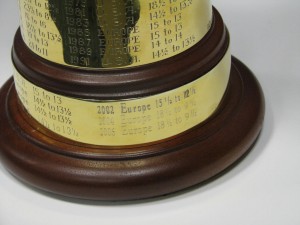Just For Fun
A Brief History of the Ryder Cup
 With much debate over the origin of its inception, most golf historians are convinced that the history of the Ryder Cup began in 1921, as the first ‘unofficial’ match was played at Gleneagles Golf Course between America and Great Britain. The second match was recorded in 1926, at which Samuel Ryder was present to observe the action.
With much debate over the origin of its inception, most golf historians are convinced that the history of the Ryder Cup began in 1921, as the first ‘unofficial’ match was played at Gleneagles Golf Course between America and Great Britain. The second match was recorded in 1926, at which Samuel Ryder was present to observe the action.
As an enterprising seed merchant and avid golf promoter, Ryder, enjoying the competitive nature of the event, felt that it would be a good idea to make the match official and thus, the Ryder Cup Tournament began. In fact, it was Samuel Ryder himself who donated the famous Ryder Cup trophy, still in use today.
Ryder was taught the game by a local course pro who eventually introduced him to Abe Mitchell, a private golf tutor who charged Ryder the rate £1,000 per year for private lessons. Ryder proved to be a dedicated student practicing driving, pitching, and putting 6 days a week at his home. At the age of 51, Ryder reached a 6 handicap and became a local course hero.
In 1927, the first official match was held in Massachusetts at Worcester Country Club. Samuel Ryder donated the coveted gold cup and agreed to pay £5 to each member of the winning team, which ultimately bound his name to the biennial competition we now call The Ryder Cup.
Since then there have been 872 individual matches played in 38 Ryder Cup tournaments. Of these, the USA has won 428 and Europe has taken 321 with 123 of the matches being ‘halved’. Team USA currently has a total Ryder Cup score of 489 ½ points to Team Europe’s 382 1/2 . The 2012 Ryder Cup will be played at Medinah Country Club in Medinah Illinois on September 25th through the 30th of this year.
Which team will you be pulling for in this year’s Ryder Cup? Discuss it on the Golficity Golf Social Network.
-
Equipment6 days ago
Bryson DeChambeau is Using Custom 3D Printed Irons at The Masters
-

 Fantasy Golf Predictions4 days ago
Fantasy Golf Predictions4 days agoFantasy Golf Picks, Odds, and Predictions – 2024 RBC Heritage
-
News1 week ago
U.S. Open Champ Takes a Dig at DeChambeau, but Is It Warranted?
-
News6 days ago
WATCH: Frustrated Ryder Cup Caption has Choice Words for Masters Patrons
-

 Apparel1 week ago
Apparel1 week agoViktor Hovland Joins Team Puma
-

 Apparel1 week ago
Apparel1 week agoChervo Golf: An Italian Masterclass in Apparel and Gear
-
News4 days ago
NOTEGATE: Neal Shipley Shuts Down Rumor that Tiger Handed him a Note
-
/cdn.vox-cdn.com/uploads/chorus_image/image/73268653/2125243325.0.jpg)
/cdn.vox-cdn.com/uploads/chorus_image/image/73268653/2125243325.0.jpg) News1 week ago
News1 week ago20 Ways to Get Invited to the Masters Tournament















